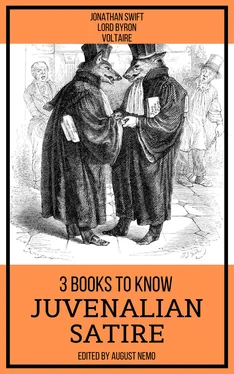Still in her teens, and like a lovely tree
She grew to womanhood, and between whiles
Rejected several suitors, just to learn
How to accept a better in his turn.
And walking out upon the beach, below
The cliff, towards sunset, on that day she found,
Insensible,—not dead, but nearly so,—
Don Juan, almost famish'd, and half drown'd;
But being naked, she was shock'd, you know,
Yet deem'd herself in common pity bound,
As far as in her lay, 'to take him in,
A stranger' dying, with so white a skin.
But taking him into her father's house
Was not exactly the best way to save,
But like conveying to the cat the mouse,
Or people in a trance into their grave;
Because the good old man had so much 'nous,'
Unlike the honest Arab thieves so brave,
He would have hospitably cured the stranger,
And sold him instantly when out of danger.
And therefore, with her maid, she thought it best
(A virgin always on her maid relies)
To place him in the cave for present rest:
And when, at last, he open'd his black eyes,
Their charity increased about their guest;
And their compassion grew to such a size,
It open'd half the turnpike-gates to heaven
(St. Paul says, 't is the toll which must be given).
They made a fire,—but such a fire as they
Upon the moment could contrive with such
Materials as were cast up round the bay,—
Some broken planks, and oars, that to the touch
Were nearly tinder, since so long they lay
A mast was almost crumbled to a crutch;
But, by God's grace, here wrecks were in such plenty,
That there was fuel to have furnish'd twenty.
He had a bed of furs, and a pelisse,
For Haidee stripped her sables off to make
His couch; and, that he might be more at ease,
And warm, in case by chance he should awake,
They also gave a petticoat apiece,
She and her maid—and promised by daybreak
To pay him a fresh visit, with a dish
For breakfast, of eggs, coffee, bread, and fish.
And thus they left him to his lone repose:
Juan slept like a top, or like the dead,
Who sleep at last, perhaps (God only knows),
Just for the present; and in his lull'd head
Not even a vision of his former woes
Throbb'd in accursed dreams, which sometimes spread
Unwelcome visions of our former years,
Till the eye, cheated, opens thick with tears.
Young Juan slept all dreamless:—but the maid,
Who smooth'd his pillow, as she left the den
Look'd back upon him, and a moment stay'd,
And turn'd, believing that he call'd again.
He slumber'd; yet she thought, at least she said
(The heart will slip, even as the tongue and pen),
He had pronounced her name—but she forgot
That at this moment Juan knew it not.
And pensive to her father's house she went,
Enjoining silence strict to Zoe, who
Better than her knew what, in fact, she meant,
She being wiser by a year or two:
A year or two 's an age when rightly spent,
And Zoe spent hers, as most women do,
In gaining all that useful sort of knowledge
Which is acquired in Nature's good old college.
The morn broke, and found Juan slumbering still
Fast in his cave, and nothing clash'd upon
His rest; the rushing of the neighbouring rill,
And the young beams of the excluded sun,
Troubled him not, and he might sleep his fill;
And need he had of slumber yet, for none
Had suffer'd more—his hardships were comparative
To those related in my grand-dad's 'Narrative.'
Not so Haidee: she sadly toss'd and tumbled,
And started from her sleep, and, turning o'er
Dream'd of a thousand wrecks, o'er which she stumbled,
And handsome corpses strew'd upon the shore;
And woke her maid so early that she grumbled,
And call'd her father's old slaves up, who swore
In several oaths—Armenian, Turk, and Greek—
They knew not what to think of such a freak.
But up she got, and up she made them get,
With some pretence about the sun, that makes
Sweet skies just when he rises, or is set;
And 't is, no doubt, a sight to see when breaks
Bright Phoebus, while the mountains still are wet
With mist, and every bird with him awakes,
And night is flung off like a mourning suit
Worn for a husband,—or some other brute.
I say, the sun is a most glorious sight,
I 've seen him rise full oft, indeed of late
I have sat up on purpose all the night,
Which hastens, as physicians say, one's fate;
And so all ye, who would be in the right
In health and purse, begin your day to date
From daybreak, and when coffin'd at fourscore,
Engrave upon the plate, you rose at four.
And Haidee met the morning face to face;
Her own was freshest, though a feverish flush
Had dyed it with the headlong blood, whose race
From heart to cheek is curb'd into a blush,
Like to a torrent which a mountain's base,
That overpowers some Alpine river's rush,
Checks to a lake, whose waves in circles spread;
Or the Red Sea—but the sea is not red.
And down the cliff the island virgin came,
And near the cave her quick light footsteps drew,
While the sun smiled on her with his first flame,
And young Aurora kiss'd her lips with dew,
Taking her for a sister; just the same
Mistake you would have made on seeing the two,
Although the mortal, quite as fresh and fair,
Had all the advantage, too, of not being air.
And when into the cavern Haidee stepp'd
All timidly, yet rapidly, she saw
That like an infant Juan sweetly slept;
And then she stopp'd, and stood as if in awe
(For sleep is awful), and on tiptoe crept
And wrapt him closer, lest the air, too raw,
Should reach his blood, then o'er him still as death
Bent with hush'd lips, that drank his scarce-drawn breath.
And thus like to an angel o'er the dying
Who die in righteousness, she lean'd; and there
All tranquilly the shipwreck'd boy was lying,
As o'er him the calm and stirless air:
But Zoe the meantime some eggs was frying,
Since, after all, no doubt the youthful pair
Must breakfast—and betimes, lest they should ask it,
She drew out her provision from the basket.
She knew that the best feelings must have victual,
And that a shipwreck'd youth would hungry be;
Besides, being less in love, she yawn'd a little,
And felt her veins chill'd by the neighbouring sea;
And so, she cook'd their breakfast to a tittle;
I can't say that she gave them any tea,
But there were eggs, fruit, coffee, bread, fish, honey,
With Scio wine,—and all for love, not money.
And Zoe, when the eggs were ready, and
The coffee made, would fain have waken'd Juan;
But Haidee stopp'd her with her quick small hand,
And without word, a sign her finger drew on
Her lip, which Zoe needs must understand;
And, the first breakfast spoilt, prepared a new one,
Because her mistress would not let her break
That sleep which seem'd as it would ne'er awake.
For still he lay, and on his thin worn cheek
A purple hectic play'd like dying day
On the snow-tops of distant hills; the streak
Of sufferance yet upon his forehead lay,
Where the blue veins look'd shadowy, shrunk, and weak;
And his black curls were dewy with the spray,
Which weigh'd upon them yet, all damp and salt,
Mix'd with the stony vapours of the vault.
And she bent o'er him, and he lay beneath,
Hush'd as the babe upon its mother's breast,
Droop'd as the willow when no winds can breathe,
Читать дальше












